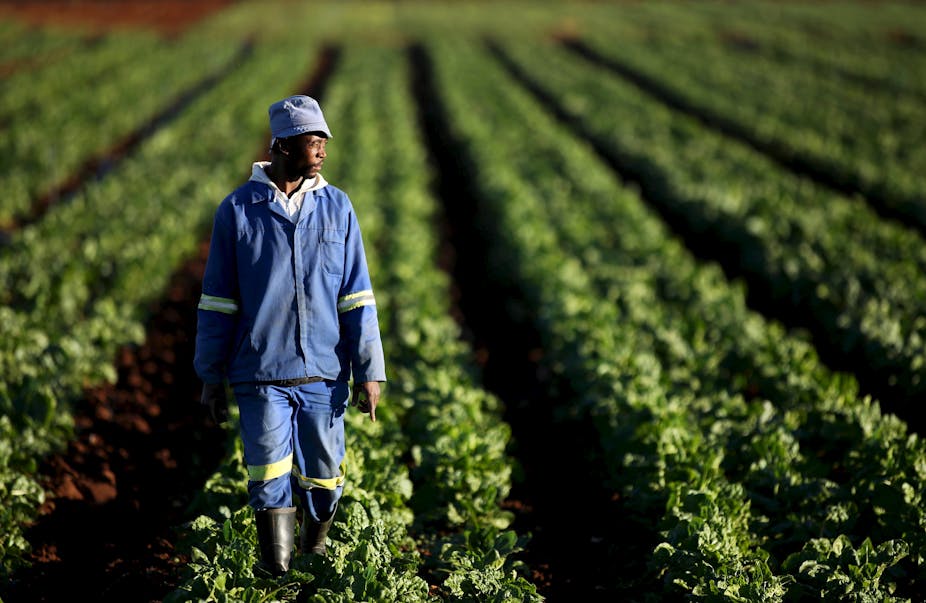South Africa’s land reform programme has suffered many failures and its beneficiaries have in many cases seen little or no improvements to their livelihoods.
Land reform remains a contested terrain or what land rights specialist Ruth Hall calls an “unresolved historical grievance”. South Africa has a history of colonisation, racial domination and racially based land dispossession. Black people were forced off the land they owned and depended on for their livelihoods through numerous legislative policies and other coercive measures.
In 1994, South Africa’s democratic government implemented land reform to rectify these past racial injustices, to correct skewed land ownership patterns and to alleviate poverty. The land restitution process is part of the broader land reform programme which includes redistribution and tenure reform.
There is a general agreement that land reform has been a failure and needs to be sped up. Research shows that between 70% to 90% of the projects (including land restitution projects) have failed.
Unfortunately, the public, academics, politicians and other stakeholders have largely focused on the land acquisition or restitution phases of the process, to the exclusion of land reform implementation and what happens afterwards.
The chorus for land acquisition has drowned out the plea by land beneficiaries for state support.
We studied the issue by focusing on a land restitution project in Macleantown, a village near East London in the Eastern Cape. Our qualitative research found that people living in the village had not benefited tangibly from having land returned to them as part of the restitution process.
What’s gone wrong
Some research has been done on the impact of land reform. Most researchers have concluded that it has contributed little to helping beneficiaries earn a livelihood from the land. The reasons for this include inadequate post-settlement support, lack of skills, poor planning and infighting within communities.
Another contributing factor has been that post-restitution projects are designed in a way that favours capital intensive commercial farming unsuitable to the beneficiaries’s circumstances. The Institute for Poverty, Land and Agrarian Studies notes that:
South African land reform beneficiaries have been victims of unworkable project designs, largely irrelevant to their livelihood possibilities, aspirations and abilities.
But the most common cause of failure is a lack of support for farmers once they become landowners.
There are many examples of thriving agricultural entities becoming ghost farms after land reform. In some cases, farm infrastructure has been stolen and production has halted.
An important component of land reform is for the beneficiaries to become self-sufficient. It is thus necessary to understand what mechanisms need to be put in place to ensure that beneficiaries can generate adequate livelihoods after they’ve been given land by the government.
The Macleantown case study
The benefits of land restitution appear to be more symbolic than material.
Our study showed that beneficiaries remain poor 17 years after being given their land back. Most are unable to generate a livelihood from agriculture and depend on state social grants for survival. Beneficiaries were able to rejoice at having their land back, but they have been unable to escape poverty.
This is particularly worrying since one of the main motives for pursuing land reform was to create self-sufficient farmers able to generate a decent livelihood from their land.
Our findings show that land beneficiaries have been virtually neglected by the government. They have a strong desire to grow crops but lack the support needed to start ploughing.
One respondent said she could not farm because she did not have money to fence her yard or keep livestock. Farming would therefore be a waste of time as cattle would walk onto her land and eat her crops.
One emotional resident said:
We don’t get the necessary support from the government man! We don’t get it, at all, they are not interested in coming to support us and help us to give us something … They should come here and make a workshop and call us together, those who are interested in farming and stuff like that, there would be a lot of people because I am not the only one… They don’t support us! They do give the land, and what’s the reason of giving people land and then not helping them? Because we need a tractor, we need this and that, we need seeds…
Apart from an absence of support, resettled people face other problems.
Water taps can run dry for days. The absence of a health clinic means that they have to use the little money they have to get services from elsewhere. The mobile clinic only comes twice a month.
The local school is too small to cater for all the pupils, forcing some to travel vast distances at huge cost. And then there are the land invaders, leading to fierce competition for grazing land.
Looking ahead
The plight of the people of Macleantown highlights the need to revive the country’s many failed land reform projects through post-settlement support strategies.
Giving people land and then depriving them of appropriate support to earn a living from the land is regressive. As much as land reform is justified, it is self-defeating for the government to dump people on land without sufficient or relevant support.
The government needs to re-look its policy of simply acquiring land for redistribution. It needs to take measures to make sure that redistributed land is used productively.
If land reform is to continue in its current fashion, its prospects are doomed. It is the government’s duty to see to it that they create self-sufficient farmers through the provision of post-settlement support.

